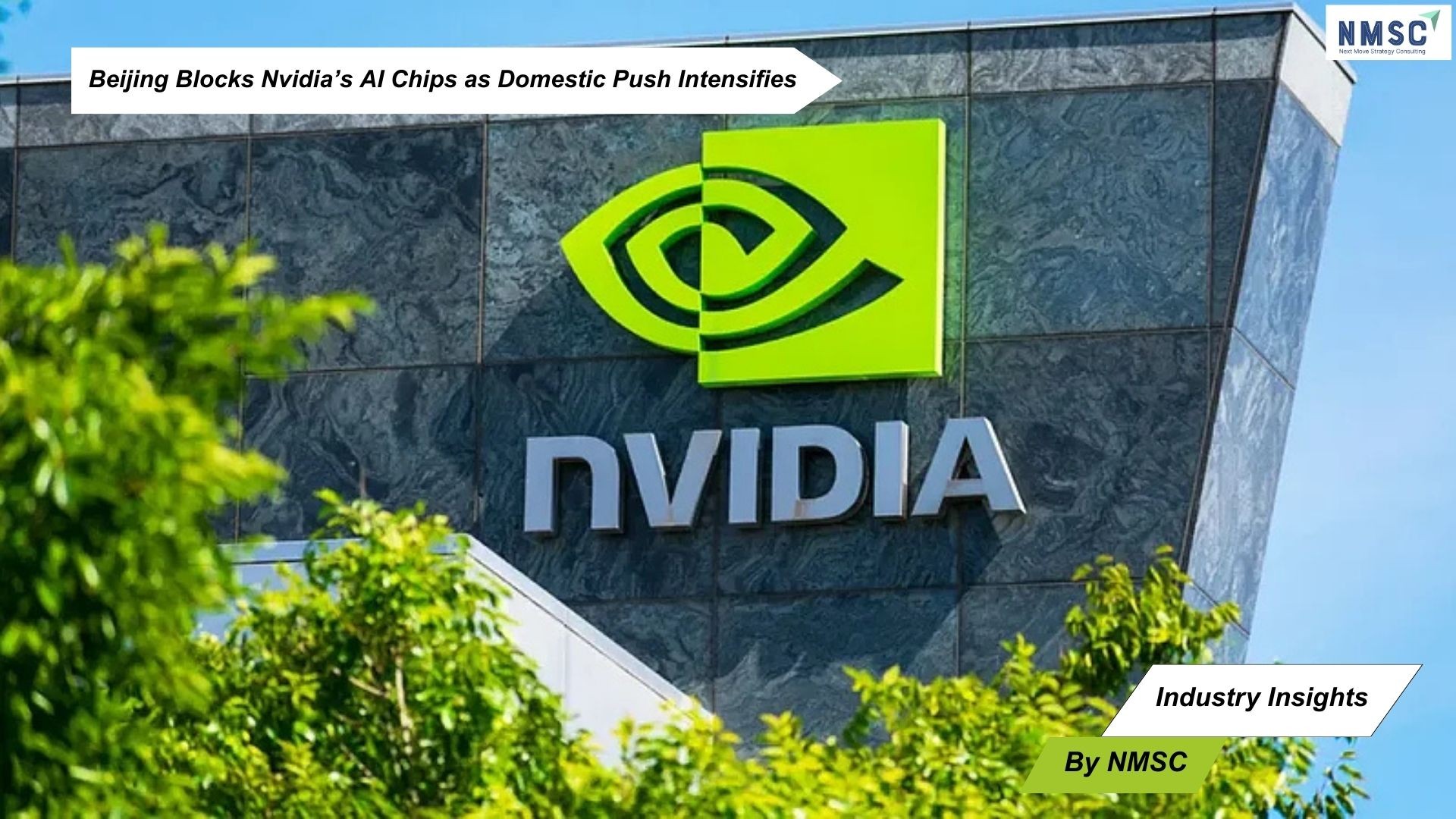Beijing Blocks Nvidia’s AI Chips as Domestic Push Intensifies
Published: 2025-09-19

Industry Insights from Next Move Strategy Consulting
Beijing has ordered major Chinese technology companies to stop buying and testing key Nvidia AI chips - including the H20 and the RTX Pro 6000D - effectively cutting off the U.S. firm’s ability to sell those products to Chinese customers, according to reporting by the Financial Times and coverage in recent press. Chinese regulators have also opened a preliminary anti-monopoly probe into Nvidia, a move that accompanies the procurement ban and signals heightened scrutiny of foreign AI hardware.
From Targeted Reviews to a Broader Market Freeze
The regulatory intervention follows earlier action in August when Chinese authorities required a national security review of Nvidia’s H20 GPUs. That review was said to be driven by concerns - raised in some quarters - that the chips could be outfitted with tracking systems. Nvidia had earlier announced a made-for-China H20 and unveiled an RTX Pro GPU aimed at smart factory and logistics uses, and several Chinese companies had begun testing or placing large orders for the RTX Pro 6000D before being told to halt those activities.
Officials reportedly summoned domestic AI chipmakers and judged that locally produced processors had reached performance levels comparable to Nvidia’s made-for-China offerings. Still, Chinese industry capacity remains a constraint: analysts warn that domestic manufacturers are not yet able to scale production to meet the full demand of the market.
Key Developments at a Glance
-
Beijing instructed major domestic tech firms to stop buying Nvidia’s H20 and RTX Pro 6000D GPUs.
-
Regulators opened a preliminary anti-monopoly probe into Nvidia.
-
Several Chinese companies had been testing and preparing large RTX Pro 6000D orders before the halt.
-
Local chipmakers were judged to have reached comparable performance on some measures, though capacity to produce at scale is limited.
-
Huawei, DeepSeek, Alibaba and Baidu have publicly advanced or begun using homegrown chips and related systems.
Industry Response and Strategic Context
Analysts characterize the moves as reflecting growing confidence in China’s domestic semiconductor capabilities and as a lever in wider trade and technology negotiations. AJ Kourabi of SemiAnalysis described the action as “likely to be a negotiation tactic as part of a broader set of discussions involving other topics including tariffs,” noting Beijing’s twin goals of encouraging silicon self-sovereignty while retaining access to top-tier chips where needed.
Some Chinese firms and research teams point to meaningful progress: Huawei introduced new AI compute infrastructure based on its Ascend chips, and internal testing has shown systems that can outperform certain Nvidia configurations on particular metrics by linking many more chips together. Chinese cloud and internet players have likewise begun to incorporate internally designed processors into AI training workflows. Yet skeptics emphasize limits: Ray Wang of Futurum Group warned that it would be “misleading to suggest the country can advance AI at a current level solely with domestic alternatives and without NVIDIA’s systematic offerings.”
Observers also note the broader negotiating backdrop. Reva Goujon of the Rhodium Group suggested Beijing may be shaping leverage - rejecting some made-for-China GPUs could create room to press for access to more advanced models amid other trade measures and investigations.
What This Means for the AI Chip Market
The combined effect of procurement bans, antitrust scrutiny, and public backing for homegrown alternatives is shifting dynamics in the AI chip space. China’s regulator actions signal both a policy push to nurture local suppliers and a willingness to use market access as diplomatic leverage. At the same time, capacity shortfalls and technical gaps mean domestic chips are unlikely to fully replace foreign offerings immediately, preserving demand tensions between performance needs and industrial policy objectives.
According to Next Move Strategy Consulting
This development will accelerate China’s strategy to strengthen its domestic AI chip ecosystem while simultaneously creating short-term dislocation for firms that rely on foreign GPUs for training and deployment. The near-term market impact will be uneven: companies already invested in domestic stacks may gain momentum, while smaller AI firms that depend on high-performance foreign processors could face disruptions. Over the medium term, expect intensified investment in scale and interconnect strategies (linking more chips to offset per-chip performance gaps) and increased geopolitical leverage around advanced GPU access - all key factors that will reshape procurement, supply chains, and competitive positioning within the global AI chip market.
Source: CNBC
Prepared by: Next Move Strategy Consulting
About the Author
 Joydeep Dey is a seasoned SEO Executive, Content Writer, and AI expert with over 2½ years of experience in digital marketing and artificial intelligence. He specializes in SEO strategy, impactful content creation, and developing data-driven, AI-powered solutions that enhance online visibility and engagement. With a strong foundation in natural language processing and emerging AI technologies, Joydeep is known for simplifying complex concepts into clear, actionable insights.
Joydeep Dey is a seasoned SEO Executive, Content Writer, and AI expert with over 2½ years of experience in digital marketing and artificial intelligence. He specializes in SEO strategy, impactful content creation, and developing data-driven, AI-powered solutions that enhance online visibility and engagement. With a strong foundation in natural language processing and emerging AI technologies, Joydeep is known for simplifying complex concepts into clear, actionable insights.
About the Reviewer
 Debashree Dey is a skilled Content Writer, PR Specialist, and Assistant Manager with strong expertise in Digital Marketing. She specializes in crafting visibility strategies and delivering impactful, data-driven campaigns. Passionate about creating engaging, audience-focused content, she helps brands strengthen their online presence. Beyond work, she draws inspiration from creative projects and design pursuits.
Debashree Dey is a skilled Content Writer, PR Specialist, and Assistant Manager with strong expertise in Digital Marketing. She specializes in crafting visibility strategies and delivering impactful, data-driven campaigns. Passionate about creating engaging, audience-focused content, she helps brands strengthen their online presence. Beyond work, she draws inspiration from creative projects and design pursuits.
















Add Comment